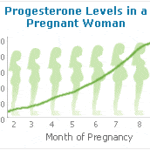
You may be wondering is morning sickness a good sign? If you’re expecting for the first time, you undoubtedly already know that the dreaded morning sickness symptom of pregnancy might be on the way. Or perhaps you’ve already begun to experience it. What might surprise you, however, is if you are one of the 1-3% of expectant mothers who suffer from the more severe disease known as Hyperemesis Gravidarum, sometimes known as severe morning sickness.
What is Morning Sickness?
During the first few months of pregnancy, nausea (feeling ill to your stomach) and vomiting are referred to as “morning sickness.” Despite the name “morning sickness,” it can strike at any time of day and last all day.
In the first trimester (the first 3 months of pregnancy), at least 7 out of 10 pregnant women have morning sickness. It usually begins at around 6 weeks and peaks at around 9 weeks. The majority of women feel better in the second trimester, but others experience morning sickness the entire time they are pregnant. Tell your doctor if you’re experiencing morning sickness.
You or your baby won’t be harmed by mild morning sickness. However, if it worsens during pregnancy (a condition known as hyperemesis gravidarum), it can lead to significant issues. For treatment, you might have to remain in the hospital.
What Causes Morning Sickness?
Pregnancy morning sickness has many causes, and each woman experiences it differently in terms of severity. One of the most frequent causes is an increase in hormone levels during the first few weeks of pregnancy. Another typical factor contributing to morning sickness is low blood sugar.
Morning sickness may get worse due to other circumstances. These consist of:
- Having triplets or twins
- Extreme fatigue
- Frequent travel
- Emotional stress
Morning sickness can differ from pregnancy to pregnancy. Even though you could have experienced severe morning sickness during one pregnancy, it might just be slight in subsequent pregnancies.
Related: High Blood Pressure During Pregnancy
When Does Morning Sickness Start?
Morning sickness typically begins during the first trimester of pregnancy, which lasts from week 1 to week 12. However, some women may begin experiencing symptoms as early as week 4, while others may not experience morning sickness until week 6 or later. In some cases, morning sickness can last throughout the entire pregnancy, although this is relatively rare.
How is Hyperemesis Gravidarum Different from Regular Morning Sickness?
Although the specific origin of hyperemesis gravidarum (HG), a severe form of morning sickness, is still unknown, it is believed that hg is brought on by increased hormone levels. Morning sickness during pregnancy normally starts around six weeks into the pregnancy and peaks between nine and thirteen weeks.
There is a significant distinction, though. The symptoms of severe morning sickness in mothers go much beyond periodic nausea and vomiting. Additionally, the illness can have a serious impact on a pregnant woman’s health, not to mention the development of the unborn child.
Morning sickness “typical” signs include:
- Mild queasiness to severe nausea (whether in the morning or throughout the day)
- Periodic vomiting (can sometimes be set off by certain smells)
- Difficulty avoiding specific foods or dietary groups
The following symptoms may indicate hyperemesis gravidarum since they are abnormal. Contact your provider if you encounter any of the following:
- Vomiting that is intense and persistent, combined with persistent nausea
- Dehydration brought on by nausea (signs of dehydration include dry mouth, thirst, small amounts of dark urine, feeling lightheaded)
- The inability to consume much food or liquids because you’re vomiting
- 5% or more of one’s pre-pregnancy weight is lost
- Headaches
- Jaundice
- Extreme tiredness
- Reduced blood pressure
Is Morning Sickness a Good Sign of Pregnancy?
While it’s no secret that feeling nauseous and vomiting is not exactly the ideal start to a pregnancy, many experts believe that morning sickness could actually be a good thing.
Well, the truth is, morning sickness is caused by the hormones in your body during pregnancy. These hormones, particularly human chorionic gonadotropin (hCG) and estrogen, play a crucial role in making sure your pregnancy is progressing normally. Studies have shown that higher levels of these hormones are linked to more severe cases of morning sickness. And, in a strange way, this could be seen as a good thing.
Think of it this way, the intensity of your morning sickness could be a sign that your pregnancy hormones are doing their job. If your body is producing more of these hormones, it’s a good indication that your placenta is functioning well and providing the right nutrients to your growing fetus. This could mean a lower risk of complications such as miscarriage or pre-eclampsia.
Now, I know what you’re thinking: “But not all women experience morning sickness and not all women who do experience it have a healthy pregnancy.” And you’re right, that’s true. Morning sickness is not a guarantee of a healthy pregnancy, and not all women who experience it have a healthy baby. But, for many women, it is a common and expected part of pregnancy, and can be a good sign that everything is going well.
So, what should you take away from this information? Well, for starters, if you’re experiencing morning sickness, know that you’re not alone. And, more importantly, it could be a sign that your pregnancy is progressing normally. However, it’s still important to talk to your healthcare provider to understand your specific situation and address any concerns you may have.
Who’s At Risk For More Severe Morning Sickness?
While some women only have mild morning sickness, others are more likely to have more severe symptoms,
Given that their hormone levels are higher than those of a pregnancy with a single baby, women who are expecting twins or other multiple babies may experience more severe symptoms.
Asking female family members, such as your mother or sister, about their experiences with nausea and vomiting can be beneficial because it is possible that it runs in the family. Other danger signs consist of:
- Migraine or motion sickness history
- A prior pregnancy that had excruciating morning sickness
- Being pregnant with a girl, but don’t use your morning sickness to predict the gender of your unborn child!
Tests For Morning Sickness
Your doctor may prescribe various tests based on your symptoms to ensure the safety of both you and your unborn child. These consist of:
Urine Test
You can check your urine to see if you’re dehydrated.
Chemical Tests on the Blood
Your physician could request the following blood chemistry tests:
CBC or a CMP
To assess the electrolytes in your blood, get a complete blood count (CBC) or a comprehensive metabolic panel (Chem-20). These examinations will reveal whether you’re:
- Dehydrated
- Undernourished
- Vitamin deficient
- Anemic
Ultrasound
Ultrasound creates images of your baby using sound waves. The doctor will next use these sounds and photos to determine whether or not your baby is growing at a healthy rate.
How is Hyperemesis Gravidarum Treated?
Around the second trimester, hyperemesis gravidarum symptoms start to subside for many mothers (14-20 weeks pregnant). However, it’s probable that some HG patients will require treatment for the duration of their pregnancies.
There are a few prescription drugs that your doctor might be able to suggest to cure severe morning sickness, but it’s crucial to explore the advantages and disadvantages and make sure you’re aware of the advantages and hazards of any drug. Your healthcare professional may also suggest other actions, such as:
Bedrest
It can have drawbacks like muscle loss and a harder time recuperating after birth, even while it may assist mothers with severe instances of hg avoid some nausea and offer some amount of comfort.
Vitamins
Some medical professionals may advise taking specific vitamins (such thiamine or other b vitamins) to reduce motion sickness and maintain electrolyte balance.
Acupressure
For some mamas, applying pressure to specific pressure points during acupressure may assist to reduce nausea. One typical pressure point is three fingers from the hand’s crease on the inside of the wrist (right between the two tendons). Sea Bands, which you can often find at your neighborhood drugstore, can help maintain steady pressure on this area.
Herbal Therapies
They include ginger pills, chews, or teas taken in modest doses.
In certain instances, HG mothers may need to be admitted to the hospital in order to get an IV of nutrition, vitamins, and electrolytes. In extreme circumstances, tube feeding may be necessary to guarantee both mother and child receive the needed nourishment.
Make an appointment with your provider right away if you think you could have hyperemesis gravidarum. To assess whether your levels are normal, they will perform a checkup on you and the baby and request blood testing. Pregnancy-related weight loss and vitamin deficiencies are major issues, mother, both for your well-being and the well-being of your developing child. To get the assistance you require, act now.
Related: What Are Early Pregnancy Symptoms?
Conclusion
So there you have it – the answer to the question that has been on the minds of so many expectant mothers: Is Morning Sickness a Good Sign of Pregnancy? While it’s not the most pleasant experience, it can be a reassuring indication of a healthy pregnancy for many women. And let’s be real, isn’t it worth it in the end to bring a new life into the world? Remember, if you’re experiencing morning sickness, don’t suffer in silence – there are plenty of ways to manage your symptoms and ensure a happy, healthy pregnancy. So take a deep breath, put your feet up, and enjoy this exciting journey. Congratulations, mama!
Frequently Asked Questions
How Common is Morning Sickness?
Morning sickness is a common symptom experienced by many pregnant women. According to the American Pregnancy Association, up to 85% of pregnant women experience some form of morning sickness.
Does Morning Sickness only Happen in the Morning?
While morning sickness is commonly associated with the morning hours, it can occur at any time of the day or night.
Is Morning Sickness a Sign of Twins?
Morning sickness is not necessarily a sign of twins or multiples. While women who are pregnant with multiples may experience more severe morning sickness symptoms, it is not a definitive sign of a multiple pregnancy.
Can Morning sickness Harm the Baby?
In general, morning sickness is not harmful to the baby. However, if you are experiencing severe vomiting or dehydration, it is important to speak with your doctor to ensure that you and your baby are healthy.














